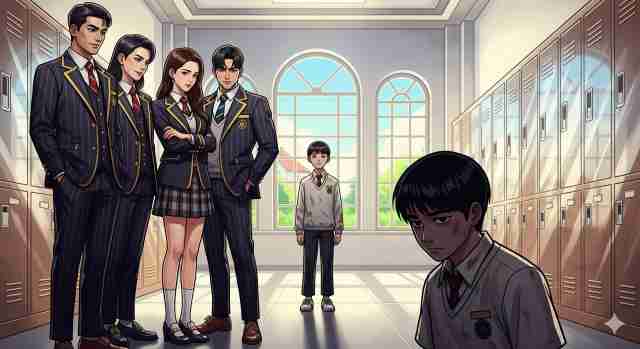Hierarchy-Themed K-Dramas: Peeling Back Privilege, Power, and Empathy in Korean School Dramas
The Rise of Hierarchy-Themed K-Dramas: Why They Matter
Hierarchy-themed K-dramas have become a cultural phenomenon, captivating audiences worldwide with their gripping storytelling and incisive social critique. Hierarchy K-Drama Trends have seen a surge in popularity, with series like “Hierarchy,” “The Glory,” and “Weak Hero Class2” topping recommendation lists. These dramas are not just entertainment; they are cultural commentaries that resonate with viewers worldwide, sparking empathy and critical reflection on issues of privilege, ambition, and justice.
Key Takeaways
- Universal Themes: Hierarchy-themed K-dramas explore universal themes with local flavor, making them relatable for international audiences.
- Complex Characters: Recent titles in this genre present complex characters with blurred moral lines, inviting viewers to empathize with all sides.
- Social Commentary: These dramas serve as mirrors to society, critiquing the very systems that produce intense rivalries and injustices.
Table of Contents
- Hierarchy-Themed K-Dramas: Peeling Back Privilege, Power, and Empathy in Korean School Dramas
- The Rise of Hierarchy-Themed K-Dramas: Why They Matter
- Why Viewers Gravitate Toward Hierarchy K-Dramas
- Spotlight on “Hierarchy”: A Case Study
- The Broader Context: Roots and Evolution of the Genre
- Not Just Fiction: Real-World Resonance and Debate
- Implications for Viewers and the Industry
- Actionable Strategies for New Fans
- Conclusion: The Enduring Appeal of Hierarchy-Themed K-Dramas
Why Viewers Gravitate Toward Hierarchy K-Dramas
At the heart of these dramas is the exploration of class differences, institutional corruption, and the pressures of meritocracy. While the stories unfold in the rarefied air of South Korea’s top schools, their themes are universal. Ambition, rivalry, and the quest for justice are struggles that transcend borders, making these series relatable for international audiences. Platforms like Netflix and Viki have made these shows easily accessible, accelerating their global popularity.
Complex Characters and Blurred Moral Lines
Recent titles in this genre have evolved, presenting characters whose motivations and actions are layered and ambiguous. The line between victim and perpetrator is often blurred, inviting viewers to empathize with all sides and reflect on the circumstances that shape each character’s choices. This complexity fosters a deeper emotional connection and sparks conversations about the real-world implications of unchecked privilege and systemic inequality.
Spotlight on “Hierarchy”: A Case Study
“Hierarchy” is set at Jooshin High School, an elite institution founded by South Korea’s top conglomerate. Here, the children of the country’s wealthiest families—comprising the top 0.01%—hold sway over every aspect of school life. The arrival of Kang Ha, a scholarship student with a hidden agenda, upends the established order, exposing the cracks in a seemingly indomitable world.
Themes and Impact
The series delves into issues of bullying, privilege, and revenge. Scholarship students face intense prejudice, while the privileged wield power with impunity. Kang Ha’s quest for truth and justice drives the narrative, challenging the status quo and forcing both characters and viewers to confront uncomfortable realities.
The Broader Context: Roots and Evolution of the Genre
The hierarchy genre in K-dramas has its roots in the classic revenge and school dramas of the 2010s. Over time, it has evolved to reflect contemporary anxieties about privilege, academic pressure, and the dark side of Korea’s competitive educational culture. These series now serve as mirrors to society, critiquing the very systems that produce such intense rivalries and injustices.
Comparison to Western Counterparts
International viewers often draw parallels between these K-dramas and Western series like “Gossip Girl” or “Elite“. However, Korean dramas are increasingly recognized for their nuanced social messaging and willingness to tackle difficult subjects head-on, distinguishing them as more than mere melodramas.
Not Just Fiction: Real-World Resonance and Debate
These dramas do more than entertain—they provoke thought and debate about real-world issues. Intense fan discussions question whether such series glamorize toxic school environments or provide necessary catharsis and critique. Real-world scandals and stories of academic pressure in Korea often surface in these conversations, adding layers of authenticity and urgency.
Empathy Through Storytelling
By humanizing both the victims and perpetrators of institutional injustice, these dramas foster empathy. Viewers are invited to see the world through the eyes of characters shaped by privilege, trauma, and the relentless pursuit of success. This emotional engagement is a powerful tool for social reflection and, potentially, change.
Implications for Viewers and the Industry
For viewers, engaging with hierarchy-themed K-dramas offers not just entertainment but a lens into the societal structures that shape lives in Korea and beyond. These series encourage empathy and critical thinking, prompting viewers to reflect on their own experiences with privilege, ambition, and justice.
For the Industry
The popularity of these dramas signals a growing appetite for stories that tackle complex social issues. International demand is driving more nuanced storytelling and broader representation, with actors like Song Hye-kyo (“The Glory”) and rising stars from “Hierarchy” gaining global recognition and opportunities.
Actionable Strategies for New Fans
- Start with the Essentials: Begin with highly recommended titles like “The Glory,” “Hierarchy,” and “Weak Hero Class2” to experience the genre’s range and depth.
- Join the Conversation: Participate in online discussions on Reddit, TikTok, and YouTube to share insights, fan theories, and recommendations.
- Look Beyond the Surface: Approach these dramas as social commentaries, not just melodramas. Pay attention to the ways they critique systems of privilege and power.
- Explore Related Genres: Branch out to other K-dramas that tackle revenge, school life, and social justice for a broader understanding of Korean storytelling.
Conclusion: The Enduring Appeal of Hierarchy-Themed K-Dramas
Hierarchy-themed K-dramas have struck a chord with audiences worldwide by blending gripping storytelling with incisive social critique. Their exploration of privilege, ambition, and justice resonates across cultures, inviting viewers to empathize, reflect, and engage. As the genre continues to evolve, it promises to remain a vital and influential force in global entertainment—one that challenges, entertains, and inspires in equal measure.
The future of K-dramas looks bright, with hierarchy-themed series leading the charge in social commentary and global appeal.


